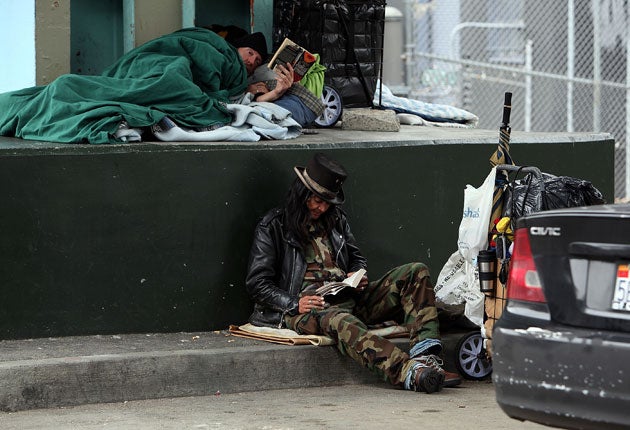Your support helps us to tell the story
From reproductive rights to climate change to Big Tech, The Independent is on the ground when the story is developing. Whether it's investigating the financials of Elon Musk's pro-Trump PAC or producing our latest documentary, 'The A Word', which shines a light on the American women fighting for reproductive rights, we know how important it is to parse out the facts from the messaging.
At such a critical moment in US history, we need reporters on the ground. Your donation allows us to keep sending journalists to speak to both sides of the story.
The Independent is trusted by Americans across the entire political spectrum. And unlike many other quality news outlets, we choose not to lock Americans out of our reporting and analysis with paywalls. We believe quality journalism should be available to everyone, paid for by those who can afford it.
Your support makes all the difference.If you're going to San Francisco, you're still perfectly entitled to wear a flower in your hair. But visitors who want to sign up to other aspects of the hippie lifestyle are about to find things a whole lot harder: city authorities have unveiled new laws that aim to crack down on the time-honoured Californian pastime of turning on, tuning in and dropping out.
In a highly controversial move, police in the Haight-Ashbury district, where the Summer of Love began more than 40 years ago, will be able to stop stoned or just lazy locals from sitting or lying on the pavements. The so-called "sit-lie" laws, which will be in place from 7am to 11pm, are intended to purge the area of drug-takers and aggressive beggars, who have been accused of harassing tourists and shoppers. People who break the ban will be hit with fines of between $100 (£66) and $500, and up to 30 days in jail.
The rules were devised by San Francisco's high-profile mayor, Gavin Newsom, who recently moved to the area. He was shocked to discover that groups of drug addicts, who have traditionally used Haight-Ashbury's bohemian streets to smoke marijuana, were smoking crack cocaine openly. Mr Newsom, a Democrat, says he eventually resorted to banning "sit-lie" on the grounds that advocates for homeless people have failed to come up with a workable alternative. "All they say is 'maybe we can have a candlelight vigil', or 'let's go out and hold hands and have some pretty music and hear speeches that mean nothing'," Newsom told reporters. "There's that, and then there's reality."
That sort of tough talk cuts little ice in America's most left-wing major city, however. A coalition of community groups organised a demonstration against Mayor Newsom's new laws last week. About 1,000 protesters sat or lay in the spots where taking a daytime nap will soon become illegal. "Making it a crime to sit on the sidewalk will not make us safer. It will only turn more of us into criminals," said Nate Miller, an organiser. "It is antithetical to the whole spirit of Haight-Ashbury, and indeed of the entire city."
Opponents of "sit-lie" argue that the law would destroy an ambience that has turned the district into a minor tourist attraction. Visitors flock to coffee shops, bars and alternative stores selling tie-dye clothes, jewellery and smoking paraphernalia.
A tour of Haight-Ashbury on Thursday revealed evidence to back up the claims both of supporters and opponents: a few buskers and street performers sitting on the pavements were almost certainly an enhancement to the colourful neighbourhood. The same could not be said, however, for several groups of drug dealers openly selling crack cocaine. Local business leaders are divided about the proposed changes. Omar Mazouf, the owner of Daydreamz, a shop selling marijuana pipes and joss sticks, supports the new laws. "At present, people sit outside and harass my customers," he said. "As a storekeeper, the law says I'm also responsible for looking after the sidewalk by the door. So even if some guy's just quietly eating or smoking, that still leaves trash that we have to clean up."
Jill Johnson, who manages a nearby clothes store called Skunk Funk, said she hoped police would selectively enforce the rules. "No one minds, say, the guy over there who sits at a typewriter writing poems for tourists. But the street kids? They've normally got dogs, lots of them have run away from home, and they basically use the streets to party in. I've had to close the store early because two of them were having a fight outside. They beg aggressively, and scare people."
Haight-Ashbury became prominent in 1967, when large numbers of people migrated to San Francisco and ended up in the district because of its cheap accommodation. The area has become partially gentrified, upsetting many of those who came there in search of an alternative lifestyle. They are now co-ordinating the campaign against "sit-lie" from Bound Together, an anarchist bookstore. "The legislation is far too broad," said Ted Hexter, who was manning the till at the store. "In practice, it means they will pick on people who don't fit in."

Join our commenting forum
Join thought-provoking conversations, follow other Independent readers and see their replies
Comments